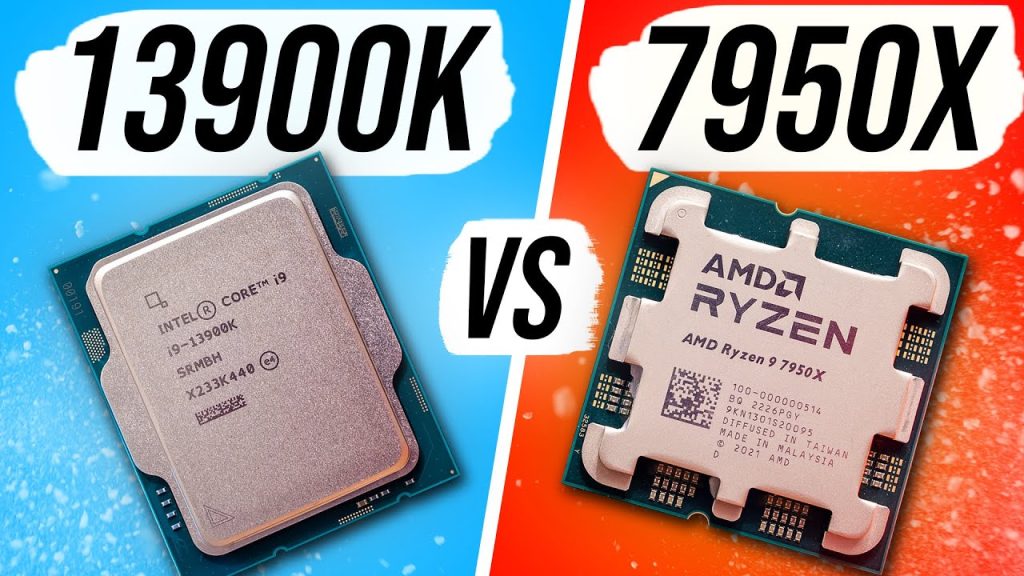In the battle of high-end consumer processors, the Intel Core i9-13900K and AMD Ryzen 9 7950X are two flagship contenders dominating the performance landscape. Both chips represent the pinnacle of their respective architectures, offering uncompromising multi-core throughput and exceptional single-core speeds. But when it comes to choosing between them, subtle differences in architecture, performance, power efficiency, and price can make a significant impact.

Architectural Differences Between i9-13900K and Ryzen 9 7950X
The Intel Core i9-13900K is built on the Raptor Lake architecture, utilizing a hybrid core design that includes 8 Performance cores (P-cores) and 16 Efficient cores (E-cores) for a total of 24 cores and 32 threads.
In contrast, the AMD Ryzen 9 7950X, part of the Zen 4 architecture, features 16 high-performance cores with simultaneous multithreading (SMT) enabled, resulting in 32 threads — no hybrid setup, just full-power cores across the board.
Performance Benchmarks: Gaming, Productivity, and Multithreading
Gaming Performance
In most 1080p and 1440p gaming benchmarks, the Intel i9-13900K often pulls ahead, thanks to its higher boost frequencies (up to 5.8 GHz) and better single-core performance. Titles that are CPU-bound—such as CS:GO, Rainbow Six Siege, and Valorant—show a 5–10% frame rate advantage in favor of the Intel chip.
However, the Ryzen 9 7950X is not far behind and still delivers elite-level gaming performance, especially when paired with high-speed DDR5 memory and a powerful GPU.
Productivity and Content Creation
For multi-threaded workloads such as video encoding, 3D rendering, and scientific simulations, both CPUs perform admirably. However, the Ryzen 9 7950X often leads in raw multithreaded throughput due to its uniform high-performance core design. Tasks involving Blender, Adobe Premiere Pro, and Cinebench R23 typically show the Ryzen chip having a 5–12% edge in total performance.
Synthetic Benchmarks Snapshot
| Benchmark | Intel Core i9-13900K | AMD Ryzen 9 7950X |
|---|---|---|
| Cinebench R23 ST | 2,300 | 2,200 |
| Cinebench R23 MT | 38,000 | 39,500 |
| Geekbench 5 ST | 2,200 | 2,100 |
| Geekbench 5 MT | 25,000 | 24,000 |
| Blender (Classroom) | 233 secs | 225 secs |
Thermal Design Power (TDP) and Efficiency
Efficiency is where AMD’s 5nm Zen 4 shines. The Ryzen 9 7950X has a base TDP of 170W, with Precision Boost Overdrive (PBO) pushing it higher under sustained load. However, its power-per-watt performance is superior in many scenarios.
On the other hand, the i9-13900K is more power-hungry, with base power at 125W and Maximum Turbo Power reaching 253W. Under heavy workloads, this often leads to higher thermal output, necessitating robust cooling solutions.
Overclocking and Customization Potential
The Intel i9-13900K supports unlocked overclocking on both P-cores and E-cores via Intel’s XTU or BIOS-level tuning. Gamers and enthusiasts seeking every last bit of clock speed can take advantage of Intel’s mature overclocking ecosystem.
AMD’s Ryzen 9 7950X also offers unlocked multipliers, and with EXPO memory profiles and Curve Optimizer, it allows for granular voltage and frequency tuning. AMD’s chip is generally easier to undervolt while maintaining high performance, a key win for thermal-conscious users.
Platform and Future-Proofing
Motherboard and Socket Support
-
Intel i9-13900K: LGA 1700 socket; compatible with 600- and 700-series chipsets. However, Raptor Lake is likely the last generation on LGA 1700, limiting upgrade paths.
-
AMD Ryzen 9 7950X: AM5 socket; compatible with X670, B650 chipsets, and PCIe 5.0 support. AM5 is expected to last for multiple CPU generations, offering long-term upgrade potential.
Memory Support
-
i9-13900K: Supports both DDR4 and DDR5, offering flexibility for budget-conscious builders.
-
Ryzen 9 7950X: Supports only DDR5, which means higher cost but also higher bandwidth and future-ready compatibility.
Price-to-Performance Value
As of the latest market trends:
-
Intel i9-13900K typically retails for $550–$600
-
Ryzen 9 7950X prices hover around $540–$580
The pricing gap has narrowed significantly, making value comparisons more nuanced. Intel offers superior gaming at a similar price, while AMD edges ahead in multi-core heavy tasks and power efficiency.
Ideal Use Case Scenarios
| Use Case | Recommended CPU |
|---|---|
| Competitive gaming (FPS, RTS) | Intel Core i9-13900K |
| Content creation & 3D rendering | AMD Ryzen 9 7950X |
| Balanced gaming + streaming | Intel Core i9-13900K |
| High-efficiency workstation | AMD Ryzen 9 7950X |
| Long-term platform investment | AMD Ryzen 9 7950X |
The Intel Core i9-13900K excels in gaming and single-threaded responsiveness, making it an ideal choice for high-refresh-rate gaming setups and streamers. It also benefits from a more flexible memory configuration and better out-of-the-box boost speeds.
The AMD Ryzen 9 7950X, on the other hand, is a multi-core beast, delivering outstanding performance in productivity workloads with better efficiency. It offers a more future-proof platform with AM5 and DDR5 exclusivity, which is appealing for users planning long-term builds.
For pure gaming dominance, the i9-13900K takes the crown. But for creators, developers, and future-proof builders, the Ryzen 9 7950X is a compelling investment. The choice depends on your specific workload, budget, and upgrade path.




